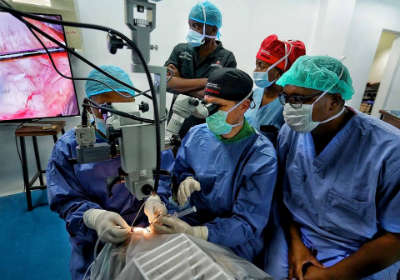Most doctors enter medicine to help people, but the complexities of federal regulations and electronic records make the job different from what you signed up for. For ophthalmologist Jeff Pettey, MD, that hasn’t stopped him from doing the work he wants: helping others.
“I’ve never heard that someone went into ophthalmology to get a job,” Dr. Pettey said. His secret to keeping ophthalmology a joyful vocation? The core value he first learned in childhood.
“I grew up in a family where my parents looked outward — always,” he said. “It’s the sort of thing where, if we had dinner on our table and someone’s mother was sick, the dinner would be picked up off the table and taken directly over.
“It was a way of living where you knew that looking out for other people was the right way to live.”
Years later, the desire to live that way himself led Dr. Pettey first to medical school and then to global ophthalmology, one reason he received the Academy’s 2017 Artemis Award. The annual award honors a young ophthalmologist for exemplary patient care and service.
In the six years since he finished residency, Dr. Pettey has worked on global ophthalmology efforts in seven countries across five continents and founded a surgical outreach program at the University of Utah’s Moran Eye Center.

Dr. Pettey teaches as Dr. Christopher Mwanansao performs sutureless small incision extracapsular cataract surgery at the University of Dodoma Tanzania.
For Dr. Pettey, serving others goes beyond simply meeting the immediate needs of patients to also thinking about solutions at a higher level. “I can’t sit by when I see someone with a need … and not do everything I can to help change the system,” he said.
Thus, one of his most recent efforts involves supporting Tanzanian ophthalmologist Frank Sandi, MD, as he develops the country’s first ophthalmology residency program (see photo). Among various ways to help ophthalmologists in underserved areas, Dr. Pettey said the best is to invest in their capacity to increase trainees.
For ophthalmologists interested in pursuing an unconventional path like Dr. Pettey’s, he offered a few tips.
- Start at home. “We have to take care of everyone in our own backyard first,” he said. In cases where Dr. Pettey can’t meet a need himself, he works to ensure that the right people are involved.
- Prioritize where your time goes. “Sit down, write out your life values, the reasons you wanted to be a physician and prioritize those things -- with time,” he said.
- Stay open to unfamiliar ideas. Cross-cultural work often involves “unique local realities” for which you weren’t trained, Dr. Pettey said. “You have to forget whatever systems and biases you’ve ever known. … You have to peel off those layers of bias in order to listen and have the conversations that are needed.”
Meeting unmet needs often takes creative solutions that in some cases may not yet exist. Dr. Pettey said open doors are the easiest way to get started on the satisfying but often unstructured path of a career like this.
“Look for whatever doors are open -- whatever is easy, whatever is open,” he said. That could range from volunteering at homeless shelters to signing up with the Academy’s EyeCare America public service program.
“As that starts feeding your passion, you will have additional doors open,” he said.
Watch the 2017 Artemis Award presentation below.